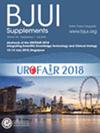局部前列腺癌患者睾酮替代疗法的肿瘤安全性:一项观察性研究的系统综述
IF 4.4
2区 医学
Q1 UROLOGY & NEPHROLOGY
引用次数: 0
摘要
目的评估睾酮替代疗法(TRT)治疗性腺功能低下的前列腺癌患者的肿瘤学安全性,因为睾酮缺乏症(TD)的患病率随着年龄的增长而上升,前列腺癌可能与治疗有关,同时导致不良的健康结果。患者和方法按照系统评价和Meta分析指南的首选报告项目,检索了Medline、EMBASE、PubMed和Scopus。研究包括评估前列腺癌和TD患者接受TRT的进展和生化复发。结果检索到4067项研究,其中19项纳入:5项主动监测,10项根治性前列腺切除术(RP)后,6项放疗后。由于比较研究的数量不足以及临床和方法学的显著异质性,合并meta分析无效。在长达70个月的回顾性随访中,主动监测的进展率从0%到32%不等,与非暴露对照组没有显著差异。TRT暴露队列的生化复发率在最终治疗后较低,RP后为0% - 7%,放疗后为0-6%(±雄激素剥夺治疗),随访长达60个月。由于缺乏长期、前瞻性、对照比较数据和缺乏对生存结果的评估,TRT肿瘤安全性的总体确定性受到限制。结论回顾性证据支持在中低风险疾病中谨慎使用TRT,积极监测和RP后或放疗后有利的局部疾病,并有适当的前列腺特异性抗原反应。在获得随机对照试验数据为前列腺癌TD的安全管理提供信息之前,需要认真选择和监测患者。本文章由计算机程序翻译,如有差异,请以英文原文为准。
Oncological safety of testosterone replacement therapy in men with localised prostate cancer: a systematic review of observational studies
ObjectivesTo evaluate the oncological safety of testosterone replacement therapy (TRT) in hypogonadal patients with prostate cancer, as testosterone deficiency (TD) rises in prevalence with age and in prostate cancer may be treatment‐related, whilst contributing to poor health outcomes.Patients and MethodsFollowing Preferred Reporting Items for Systematic Reviews and Meta‐Analyses guidelines, Medline, EMBASE, PubMed, and Scopus were searched. Studies were included assessing progression and biochemical recurrence in men with prostate cancer and TD receiving TRT.ResultsSearches yielded 4067 studies, of which 19 were included: five in active surveillance, 10 post‐radical prostatectomy (RP), six post‐radiotherapy. Pooled meta‐analysis was not valid due to insufficient number of comparative studies and significant clinical and methodological heterogeneity. Progression rates on active surveillance ranged from 0% to 32% and did not differ significantly to non‐exposed controls on retrospective comparison at follow‐up as long as 70 months. Biochemical recurrence rates in TRT‐exposed cohorts were low post‐definitive treatment ranging from 0% to 7% post‐RP to 0–6% post‐radiotherapy (± androgen deprivation therapy) with up to 60 months of follow‐up. Overall certainty of TRT oncological safety is limited by lack of long‐term, prospective, controlled comparative data and lack of assessment of survival outcomes.ConclusionsRetrospective evidence supports cautious use of TRT in low–intermediate‐risk disease on active surveillance and favourable localised disease post‐RP or post‐radiotherapy with appropriate prostate‐specific antigen responses. Diligent patient selection and monitoring are required until randomised controlled trial data are available to inform safe management of TD in prostate cancer.
求助全文
通过发布文献求助,成功后即可免费获取论文全文。
去求助
来源期刊

BJU International
医学-泌尿学与肾脏学
CiteScore
9.10
自引率
4.40%
发文量
262
审稿时长
1 months
期刊介绍:
BJUI is one of the most highly respected medical journals in the world, with a truly international range of published papers and appeal. Every issue gives invaluable practical information in the form of original articles, reviews, comments, surgical education articles, and translational science articles in the field of urology. BJUI employs topical sections, and is in full colour, making it easier to browse or search for something specific.
 求助内容:
求助内容: 应助结果提醒方式:
应助结果提醒方式:


